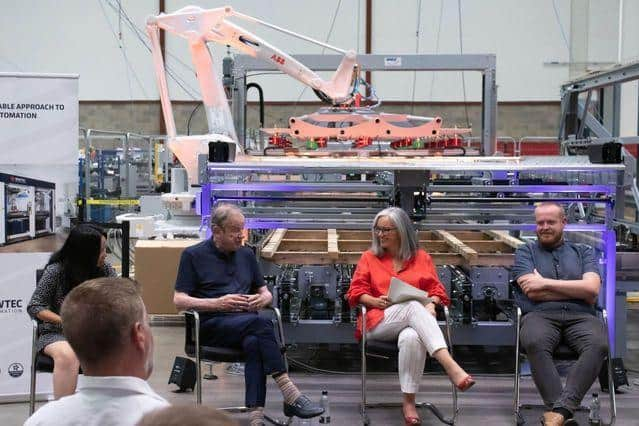More women must establish careers in manufacturing, says former Minister for Europe Caroline Flint
Some of the country’s leading manufacturers and academics gathered in Wakefield to highlight the role the manufacturing industry could play in boosting economic growth.
The panel said that manufacturing could help to rebalance investment and industry across the country, by driving higher levels of GDP growth, creating more well-paid jobs, and increasing British exports.
Advertisement
Hide AdAdvertisement
Hide AdThe panel discussion was held at Sewtec Automation, who had joined forces with Coventry-based research and technology organisation Manufacturing Technology Centre (MTC) and cross- party think tank The Institute for Prosperity (JMI). JMI seeks to revive communities, such as Wakefield, that have suffered from a steep decline in manufacturing over recent decades.


The panel was moderated by the former Labour MP for Don Valley Ms Flint, who is also the Chair of The Institute for Prosperity.
Ms Flint told The Yorkshire Post: "We talked a lot about the image of manufacturing. There is still a perception that manufacturing is old fashioned and quite a dirty place to work and environment. People aren't aware of the sort of work that is going on.
"We desperately need more young men and women to think of manufacturing as the place for them. There was general agreement that we should be encouraging policy makers to set a goal of manufacturing making up 15 per cent of GDP, instead of just 8-9 per cent of GDP"


Advertisement
Hide AdAdvertisement
Hide Ad"The average pay in manufacturing is around £32,500 and it can play a role in rebalancing the economy.
"It's particularly important to get more women into manufacturing. I feel that there should really not be any 'no go' areas for women in the workplace.
"The shopfloor has completely changed since the days when I worked in a food processing plant placing spaghetti into tins. I don't feel the public perception of manufacturing has caught up with reality.
"There are still roadblocks to progress. Around one third of manufacturers hadn't heard, for example of the National Skills Fund (which aims to help adults gain the skills they need to improve their job prospects). Sometimes there is a bit too much bureaucracy and it's useful to keep companies briefed on how to access support.
Advertisement
Hide AdAdvertisement
Hide Ad"There are still too many manufacturing companies having to operate out of poor quality buildings. There are a large number of parks for offices, but very few offering accommodation for manufacturers. If accommodation is made available, that has a domino effect.
"Yorkshire and the Humber is very much at the heart of tackling climate change. Manufacturers are creating a working environment that is low carbon and by growing and exporting around the world they are helping to pay for the NHS and building new schools.
"During the pandemic, manufacturers stepped up to support supply chains,'' she added.
"In terms of levelling up, there was a little weariness about the number of slogans attached to it. That's part of the problem; people want a real sense of the values behind levelling up."
Advertisement
Hide AdAdvertisement
Hide AdMs Flint added: "We need to make sure that the right policies are put in place to not only protect manufacturers – but to make it pay to site and ‘reshore’ new manufacturing facilities here
too.
"We all agreed that investment in innovation and a confident workforce where young people, especially girls, see a future for themselves working in manufacturing and engineering is especially important.
“We need to find solutions so that people can see a career in manufacturing from an early age and the jobs and opportunities manufacturing creates in the places they live. Leading
manufacturers, like Sewtec, play an important role in the local community, providing high skilled jobs to hundreds of local people, investment in emerging technology, and exporting British made goods.”
Advertisement
Hide AdAdvertisement
Hide AdThe panel included JMI founder and economist John Mills, who chairs consumer goods distribution company JML; Mike Wilson, Chief Automation Officer at MTC; Mark Cook, Chairman at Sewtec; Tom St John, Multimedia Editor at The Manufacturer, and manufacturing academic Dr Yan Wang.
John Mills, founder of the Institute for Prosperity, said: “It is clear our manufacturing industry is in a dire state. More than 16% of people worked in manufacturing around 20 years ago, but today that number is closer to 8%. For far too long has the Government run the country in favour of bankers in London rather than makers in Wakefield."
Dr. Yan Wang, Principal Lecturer in manufacturing and engineering at the University of Brighton, highlighted the potential for the UK to become a leader in remanufacturing, which is the process of rebuilding ‘as-good-as-new’ products using a combination of reused, repaired, and new parts.
Mark Cook, Chairman of Sewtec, said that manufacturers, Government, and the wider industry needed to do more to transform perceptions of manufacturing as being a ‘dirty and unsafe’ industry to that of being an innovative, high-tech, and cutting-edge sector, like Sewtec’s own facility.
Comment Guidelines
National World encourages reader discussion on our stories. User feedback, insights and back-and-forth exchanges add a rich layer of context to reporting. Please review our Community Guidelines before commenting.
